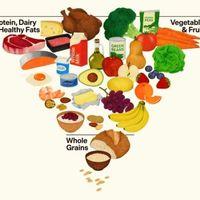More Regulations News
U.S. Trade Leaders Unveil Enhanced Export Plans For Potatoes As Global Markets Expand
Federal Bill From Wisconsin Looks To Boost Access To Free School Lunch
USDA To Hold Hearing After Withdrawing Previous Salmonella Regulations
New Federal Law Requires Annual Allergy Training For School Foodservice Employees
RFK Jr.’s New Dietary Guidelines Flip The Food Pyramid Upside Down
Image Source: Department of Health and Human Services
First released in 1992, the USDA Food Guide Pyramid prioritized grains, fruits, and vegetables for Americans, with those foods forming the largest foundation of the pyramid. Fats, oils, and desserts shown at the top of the pyramid were to be moderated. In 2011, the USDA changed the pyramid image to MyPlate, a dinner-plate visual introduced by then First Lady Michelle Obama that simplified the pyramid but had similar dietary recommendations. Last month, Health Secretary Robert F. Kennedy Jr. unveiled revived the pyramid image with two important changes: 1) the pyramid has been literally flipped upside down so the point of the triangle is at the bottom, and 2) grains—even whole grains—are less recommended than saturated fats and proteins. The new visual and dietary recommendations have some nutritionists and health professionals scratching their heads.

U.S. Commerce Department Proposes 107% Tariff On Italian Pasta Exports
Image Source: Brandon Bell / Getty Images
U.S. tariff rates on imported pasta could skyrocket up to 107% next month, affecting popular brands like Barilla, Garofalo, and Rummo, and most likely raising prices for consumers. Back in September, the U.S. Commerce Department issued a 92% tariff on 13 of the biggest Italian pasta exporters, and it's set to take effect this January, along with the existing 15% blanket tariff on EU exports. The move was put in place to level the playing field for American manufacturers, as legislators allege that popular Italian pasta brands are undercutting U.S. prices. The latest decision has pushed chefs like NYC's Salvo Lo Castro to move from importing Italian pastas restaurant to having staff make pasta by hand instead. “I don’t want to change the price for my guests," sas Lo Castro, "it’s very important."

More Regulations News
EPA Approves New PFAS Pesticides, Stoking Food Safety Concerns
The U.S. Issues Tariff Exemptions On Brazilian Coffee And Beef
Michigan Schools Debate Updating Peanut Allergy Guidelines As Rates Fall Among Youth
British Researchers Argue Rise In Ultra-Processed Foods Are A Global Health Threat
Trump Administration Considers Resurrecting The Food Pyramid
Judges Order Trump Administration To Continue Funding SNAP Benefits Amid Government Shutdown
Image Source: Getty Images / BBC
Earlier this month, the Trump Administration warned that Supplemental Nutrition Assistance Program (SNAP) benefits would be revoked during the current government shutdown. The program provides low-income Americans with a monthly loaded debit card earmarked for groceries and food products. Approximately 42 million U.S. citizens rely on the program to get by. This past week, U.S. judges determined the removal of these funds to be unlawful in two different rulings. Dozens of U.S. states have already sued the administration and are likely to win their cases, according to Massachusetts U.S. District Judge Indira Talwani. "Congress intended the funding of SNAP benefits, at a reduced rate if necessary, when appropriated funds prove insufficient," she says.

Brazilian Beef Importers Suspend Buys Due To Food Safety Questions
Image Source: Etienne Girardet / Unsplash
Brazil is a world-leading beef exporter, but tensions over food safety are reducing imports in the U.S. President Donald Trump pushed for a 76% tariff on imported Brazilian goods in the name of accountability. Meanwhile, Senators Mike Rounds and Jon Tester sponsored a bipartisan bill to suspend Brazilian beef imports all together. “Producers' livelihoods are being compromised by Brazilian beef imports that fail to meet our country’s food safety and animal health standards, as Brazil has a history of failing to report, in a timely and accurate manner, diseases found in their herds,” said Senator Rounds.

NYC Plans To Ban Processed Meats In All Government Run Food Programs
Image Source: Stock / Vegan FTA
New York City announced major changes to the city's food standards, and processed meats of any kind will no longer be served in hospitals and public schools. This change will effect hundreds of meals distributed annually among school children, seniors, and patients in hospitals throughout NYC. Michelle Morse of the New York City Health Department said, "Every New Yorker deserves access to delicious healthy food that they feel good about eating. The new Standards underline our longstanding work to ensure New Yorkers have access to healthier foods while advancing our commitment to health equity and climate health."

California Bill Aims To Streamline Restaurant Permitting Process
Image Source: Randall Benton / Getty Images
Opening a restaurant in California is notoriously difficult due to never-ending heaps of paperwork and dragged out permitting processes. Saltwater Bakeshop in San Francisco had their opening delayed more than two years due to government red tape. Assembly Bill 671 could fix that, recently brought forth by Assembly Members Buffy Wicks of Oakland and Jesse Gabriel of Los Angeles County. The bill proposes a requirement for "local building departments to approve or deny restaurants' permit applications within 20 business days.” The bill will be heard in the chamber on August 18th.
